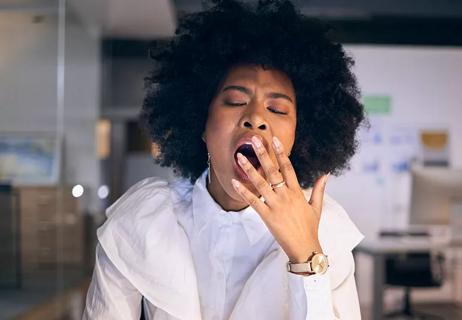Changing how you breathe, gargling water and distracting yourself are all common ways to stop your diaphragm from spasming

Drink water upside down! List all the rabbits you know! Watch something scary! Natural remedies for hiccups can run the gamut, from the scientific to the ridiculous.
Advertisement
Cleveland Clinic is a non-profit academic medical center. Advertising on our site helps support our mission. We do not endorse non-Cleveland Clinic products or services. Policy
Internal medicine physician Kayla Rapp, DO, shares what works — and why hiccups happen in the first place.
A hiccup is basically a muscle spasm. It happens when your diaphragm (a muscle located between your lungs and stomach) becomes irritated.
“Hiccups happen when there’s a disturbance in the nerve pathways that lead from the brain to the diaphragm,” Dr. Rapp explains. Those irritated nerves —specifically, the vagus nerve and phrenic nerve — cause your diaphragm to contract involuntarily and suck in air. The “hic” sound is from your vocal cords closing to prevent more air from entering.
Most people have transient hiccups, meaning they happen randomly and resolve quickly. Among other things, transient hiccups can be caused by the types of food and drink you consume — and how much, or how fast, you consume them. Intense emotions, smoking and swallowing too much air (aerophagia) are also common culprits.
You’re probably familiar with several home remedies for hiccups, most of which have no scientific basis. When it comes to hiccups, that’s the best modern medicine can offer right now. After all, hiccups are tough to study!
Dr. Rapp shares a few go-to suggestions for halting your hiccups. Keep in mind, these are based on personal experiences, not scientific evidence (and success rates will vary).
Advertisement
The thought behind holding your breath to stop hiccups is simple: You’re altering the balance between air and carbon dioxide in your body.
“Holding your breath increases carbon dioxide levels in your lungs and may relax your diaphragm,” Dr. Rapp explains. Take a deep breath and hold it for about 10 to 20 seconds. Then, exhale slowly. Repeat the process a few times to see if it helps.
Breathing into a paper bag is another way of changing your respiratory balance. It may “trick” your hiccups into going away. Like holding your breath, breathing into a paper bag raises your carbon dioxide intake.
Place the bag over your nose and mouth. Inhale and exhale, allowing the bag to inflate and deflate.
Note: Never use a plastic bag for this technique. Doing so runs the risk of asphyxiation (choking).
Another option is changing the way you breathe. Try taking slow, measured breaths by counting to four, focusing on each inhale and exhale. If your hiccups are stress-induced, this mindfulness practice can help calm your body down.
Drinking more water may help banish hiccups. But Dr. Rapp says gargling water may be the better option. That’s because gargling stimulates the nerves in the back of your throat.
Getting into the fetal position may help relieve hiccups, too. This posture puts gentle pressure on your diaphragm, which may stimulate the nerve pathways enough to interrupt that hiccup-y rhythm.
Gently grazing the roof of your mouth with a toothbrush or cotton swab may stimulate your vagus nerve, interrupting the involuntary reflex that’s causing your hiccups.
A bit of ice-cold water may be all it takes to shock your hiccups away. Like tickling the roof of your mouth, this approach also stimulates your vagus nerve.
Focus on taking small, slow sips. You can also try sucking on an ice cube for a couple of minutes instead. Once it’s melted, swallow the cold water.
Stimulating your vagus nerve with certain foods might drive your hiccups away, too.
Some people get rid of their hiccups by sucking on a lemon — some even add salt to it for an extra kick. On the flip side, you can also try putting granulated sugar on your tongue and letting it dissolve. Let it sit for about 10 seconds, then swallow.
It’s hard to scare yourself. But if you can enlist the help of a friend or loved one, this fan favorite may actually put a stop to your hiccups. Like so many of the other approaches on this list, being startled is a way of overwhelming your vagus nerve.
Advertisement
You’ve probably done the Valsalva maneuver many times, without knowing what it’s called. It’s a common technique for popping your ears and slowing your heart rate.
Take a deep breath. Before breathing out, squeeze your nose shut and close your mouth. Now blow out for 10 to 15 seconds against your closed mouth. If you’re lucky, the strain you’re creating will stimulate your vagus nerve enough to give your hiccups the boot.
If nothing else seems to be working, ignoring your hiccups may be the best way to send them packing. Count backward from 100, recite the alphabet backward or make a mental list that requires intense concentration. Not only could this help your hiccups disappear, but it may also calm you down if you’re feeling stressed.
Hiccups are usually short-lived. If they last for several days, it’s important to see a healthcare provider. Long-lasting hiccups may be a sign of an underlying medical condition.
“Sometimes, certain diseases, medications or procedures — especially those involving anesthesia — can cause prolonged bouts of hiccups,” Dr. Rapp shares.
But your average, run-of-the-mill hiccups? You probably don’t have to do anything to get rid of them. Chances are good they’ll go away on their own if none of these at-home strategies work.
Advertisement
Learn more about our editorial process.
Advertisement

Simple at-home solutions, like doing pursed lip breathing and drinking a warm beverage, can often bring immediate relief

Mouth taping may seem promising, but it can actually cause more harm than good, especially if you snore or have sleep apnea

When something like food or drink goes down your windpipe rather than your esophagus, it can cause coughing and sometimes choking

Getting vaccinated in October can help protect you against severe illness between November and March

Breathing through your nose is far better for you, but depending on your anatomy, that may not always be possible

Cut up foods into small pieces and make sure you sit down and focus during meals

One theory is brain temperature regulation, and yes, a ‘contagious yawn’ is a real thing

Dry drowning is an airway closure from choking on water without getting fluid in your lungs

The tropical fruit is a good source of antioxidants and vitamin C

Most people fall asleep within 10 to 20 minutes, but if your experience is different, adjusting your sleep schedule may help

Exploring your hidden side can lead to better understanding of what makes you tick